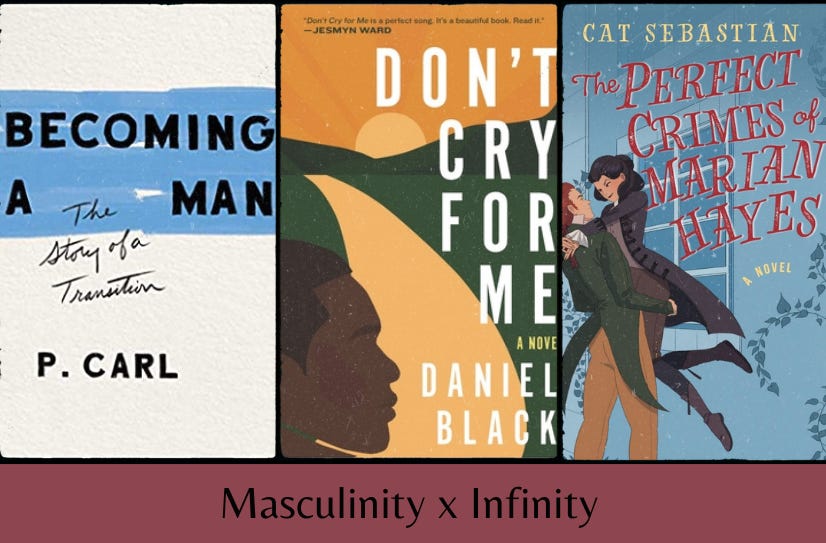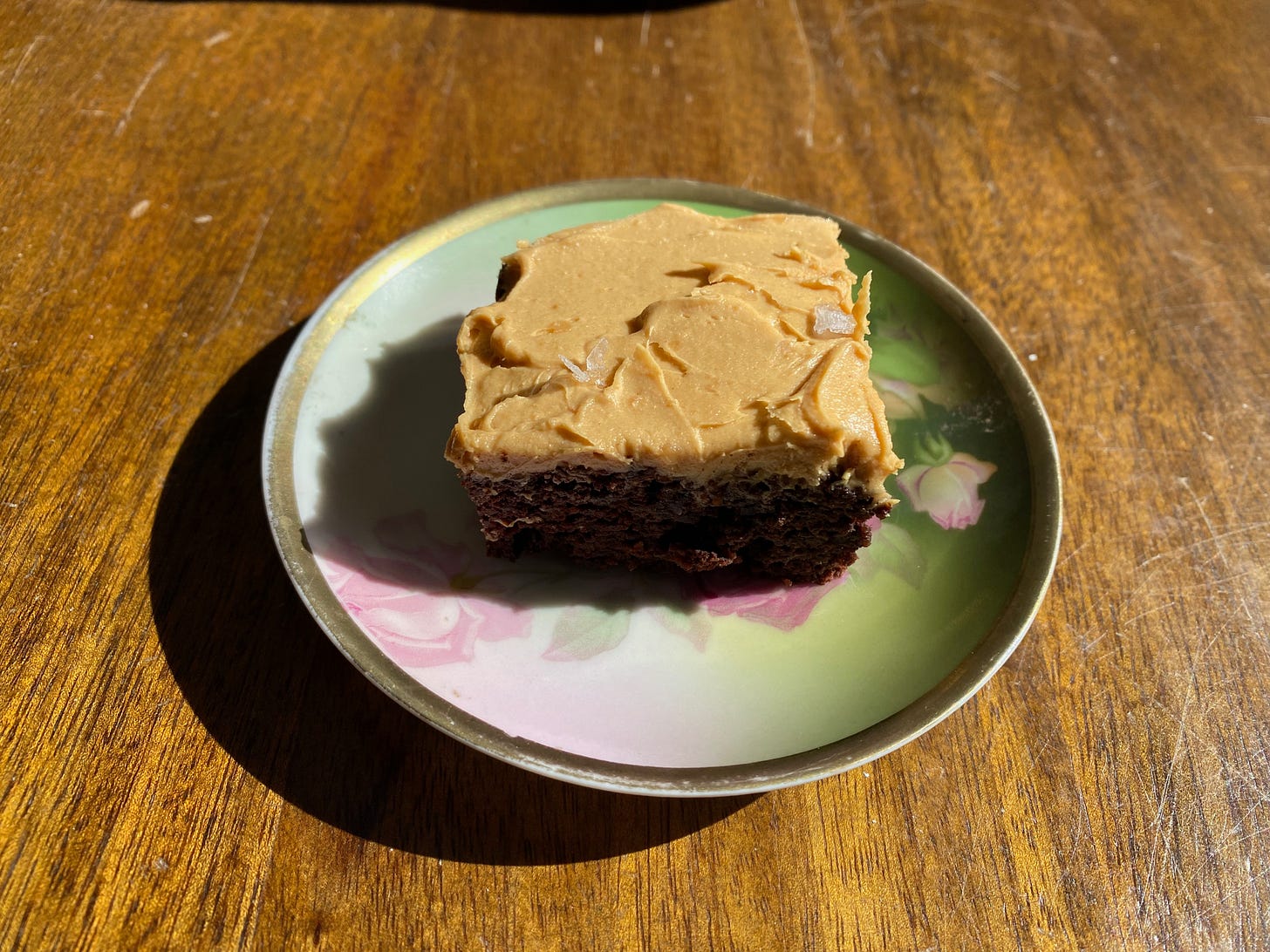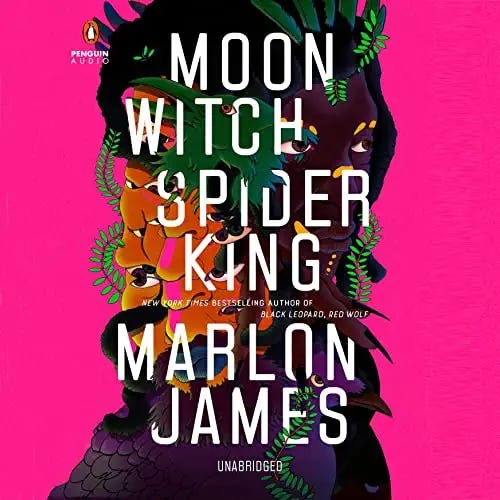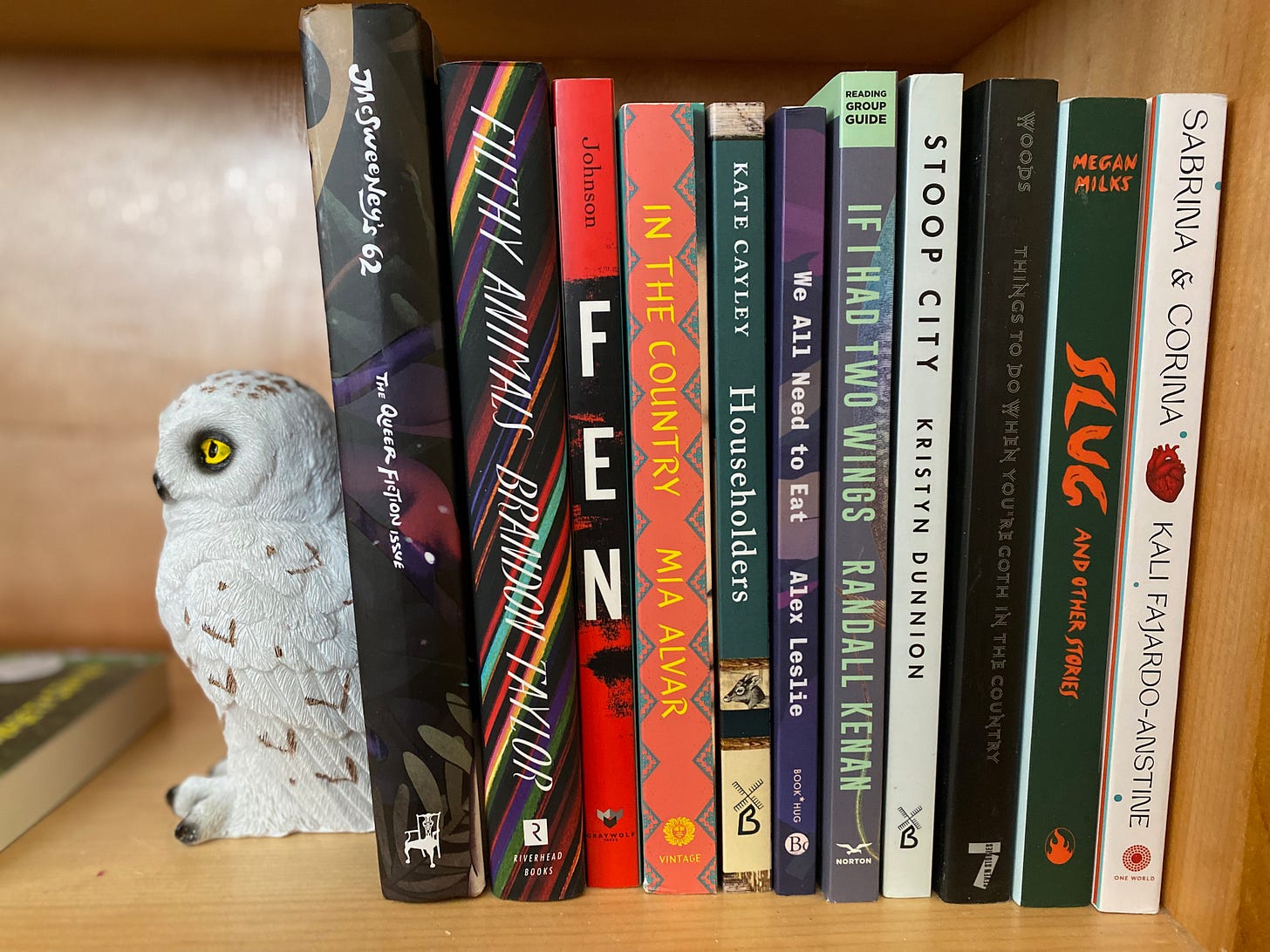Greetings, book-eaters and treat-lovers!
I often think about the internet—and social media in particular—as a vast ocean. Waves ripple across its surface—sometimes massive waves with the power to obliterate cities, sometimes gentler ones. For a while, the waves are all anyone can see. And then the waves recede, and suddenly we’re no longer talking about anti-Asian violence or the occupation of Palestine or the sustained attack on trans kids that’s happening in Texas and elsewhere. The ocean, of course, remains. The waves recede, but the systems that cause them to erupt remain. And there’s so much that never even becomes a wave—the daily suffering (and joys, too) of people all over the world whose lives and struggles never ruffle the waters of Twitter and Instagram.
I don’t have anything profound to say about it all, beyond the acknowledgment that it is surreal and scary and extremely disorienting, being a human in the world, being a human on the internet, which is a part of the world. Last week this brilliant poem by Ukrainian poet Ilya Kaminsky (whose book Deaf Republic is staggeringly good) was all over my feed, and I read it every time I came across it, and cried every time. I’m currently reading Birthright by Palestinian American poet George Abraham, a book of poems mostly about the occupation of Palestine. It is heartrending to read, always, but especially now, when the ocean seems so deep, when the suffering of so many people, which is endless, feels so close to the surface. I donated some money to the Trans Education Network of Texas and World Central Kitchen and Trans Social (Florida). Honestly it feels like throwing boxes of bandaids at freshly bleeding wounds, but here we are. I did a small thing. I took my pup for a walk on the ridge. Next week, I will do another small thing. We will walk again on the ridge and I will be awed again by its beauty. The waves will keep coming and receding. The ocean will remain.
On that grim note, let’s talk about masculinity. I don’t have anything profound to say about it, either. Two of these books delve into toxic masculinity and the violence it does, the cycles of pain and abuse it causes. The third is a romance about a gentle, loving, adorable muffin of a man. It delighted me.
The Books
Backlist: Becoming A Man by P. Carl (Memoir, 2020)
I read this book a few years ago, but I still think about it often. It’s a book about transition, but Carl approaches transition through so many lenses. He writes about the strangeness and the joy of coming into masculinity, particularly white masculinity, and examines how the way the world views him also changes how he views himself.
Carl transitioned at 51, after a lifetime of knowing himself as a man but not living as one. His prose is full of agility, humility, and self-analysis. He interrogates how it felt to live as a woman, and all the complexities of how that life affected his experience of manhood. It's a book about wrestling with masculinity in all its ugly and benign forms. Carl does not paint himself as the hero, really. He’s drawn to masculinity, even toxic masculinity, and he pokes around at that, trying to figure out what’s him, what’s the patriarchy, what’s misogyny. It’s a painful, messy process, and I appreciate that he leaves so many questions unanswered, though he’s never afraid to ask them. He’s still in the process—all of us are always still in the process—so his willingness to recount his experiences, without justifying them, or mapping them onto some predetermined diagram of manhood—is poignant.
There is so much nuance and uncertainty and contradiction. Carl is willing to tell a lot of messy truths, and the result is a book that’s one specific story of one particular trans life, but also a book that gets into all the crooks and crannies of identity. It also has some of the clearest and most breathtaking writing about bodies—and the ways that truth, knowledge, identity, trauma, history, and experience live in bodies—that I’ve ever read. The writing is at times analytical and introspective, but it always comes back to the body. How it feels to live in a body. How it feels to be displaced by your own body, to come home to your body.
In one section, he recounts how his transition affected his marriage. It’s incredible how many angles he’s able to illuminates, even about something so intimate. He gets right to the heart of transphobia in queer communities, especially lesbian ones. But he also writes about the real and violent ways maleness and masculinity harm women, and the complexity of how that plays out in queer relationships. He also writes eloquently about his varied relationships with and experiences of queerness throughout his life—though he does not explicitly identify as queer (and there’s a brilliant chapter where he examines in detail what it means to shit out of queerness).
There are many gorgeous and smart lines throughout the whole thing, but this is the one that will stay with me forever:
We are still here together because we are holding on to the knowing that multiple truths, and multiple bodies, are possible.
This book is a celebration of multiple truths, of the multiplicity of lives lived in one body and the multiplicity of bodies that one life can hold, and of all the possibilities that exist in the complexity of human experience.
I highly recommend the audio, which Carl reads. It’s just over five hours and worth every minute.
Frontlist: Don’t Cry For Me by Daniel Black (Fiction)
I read this a few weeks ago and I’ve been going back and forth about whether to review it here. I can’t say I enjoyed reading it, though, to be fair, I don’t think it’s a book that’s meant to be enjoyed. It’s one of those books that made me go “hmmm” and want to look away and move on to something else as soon as I finished. But I’ve been sitting with it for a while, and the more I think about it, the more I come to respect and appreciate what Black is doing with it.
Jacob, a Black man on his deathbed, decides to write a series of letters to his estranged gay son, Isaac. He knows he’s dying, and he wants to explain himself, to tell Isaac something of who he is, to offer some context for how he treated Isaac throughout his life. Jacob shares stories of growing up in rural Arkansas with his grandparents, about his early life with Isaac’s mother, and about the secrets he kept from himself and his family during Isaac’s childhood. He speaks about the weight of inherited intergenerational trauma that he’s carried his whole life.
The setup, of course, is a redemption arc. But this is not a book about redemption, and this is what makes it so powerful, and why I think it’s so successful. Jacob sets out to make amends. He wants to reconcile with his son. He doesn’t. Isaac does not appear in the narrative. He never writes back. Jacob, in essence, is speaking to himself through Isaac. I am pretty much over books with a storyline that goes like this: Homophobic father realizes he was an asshole. Homophobic father learns the error of his ways. Homophobic father apologizes and makes amends. Homophobic father reconciles with his queer son. Cue rainbow confetti.
There are a lot of books in the world, and I just don't want to spend time inside the head of a blatantly homophobic person. In Jacob’s case—as is so often the case—his homophobia is learned and inherited. He reacts the way he does to his son’s queerness because of the lessons he’s been taught by the world about masculinity. He knows, intimately, how dangerous it is to be a Black man in the world, and he is trying to keep himself safe, to keep his son safe. He is not evil. Like Isaac, he’s been wounded by the homophobic, racist world. Even so, even knowing this, I usually can’t stomach a book like this. But I stuck with this one.
I stuck with it, in part, because of the gorgeous writing, the vivid sense of place, and Black’s ability to capture so much emotion and movement in every scene. I stuck with it because of Black’s absolutely magnificent narration (I listened to the audiobook). I was also intrigued by the introduction. Black shares that his father died before the two of them had a chance to reconcile; that his father’s reaction to his queerness remained a wound between them. He wrote the novel as a way of connecting with his father. So. I wanted to listen.
But the thing that has stuck with me, all these weeks later, the thing that makes this book sing for me, is Black’s refusal to tell a simple redemption story, a “Straights Learn Their Lesson” story. Jacob’s journey is about self-discovery and self-forgiveness. It’s not really even about Issac. He’s dying, and the hard truth is that he’s already lost his chance with his son. He even admits this at one point, saying something along the lines of “the time for this to make a difference was years ago.” The letters are a way to reckon with his own past, his mistakes and his wounds, the heartbreaks and challenges of his life, his small joys and successes and deep failures. It’s an internal journey, one I was both moved and challenged by.
There’s another truth Black hits right in the heart, and it’s that many queer people choose to live with broken familial relationships. Many queer people choose to love family members who have rejected them, who don’t see them fully, who are blatantly or passively homophobic. The world is a lot more complicated than me saying: “I do not want to read a book with a homophobic POV. I don’t care how empathetic and thoughtful it is.” Some queer folks choose to end relationships with family. Other queer people have that choice made for them by their families. And some choose to live with the pain, to slip pieces of themselves away when they go home, because those relationships aren’t purely bad. With this book, Black honors queer people and all of those painful choices. It’s a hard read, but at times it feels like an affirmation.
I’ve written before about the straight gaze in literature, and how much I prefer stories that don’t utilize it. Don't Cry For Me is an example of a queer author using the straight gaze thoughtfully, with purpose. Black’s craft is stunning. There’s so much here about Blackness and the South that I haven’t even touched on in this absurdly long review. As I continue to sit with this book, I keep finding more and more to love about it.
Upcoming: The Perfect Crimes of Marian Hayes by Cat Sebastian (Historical Romance, Avon Books, June 7th)
Look, there’s a lot I could say about this book, but mostly I just want you to know that it’s a hilarious and tender road trip romp about an extremely competent woman who’s just murdered her husband (he really deserved it) and a gentle, gentle thief who just wants to flirt with everyone (as long as they’re into being flirted with), hang out with newborn kittens, and rescue puppies.
Rob is a sunny daffodil of a man, generous and loving, fiercely loyal, consistently cheerful. He’s also deeply lonely and has spent most of his life putting his friends and loved ones first. Marian is a steely knife of a woman who’s been hurt again and again and is, frankly, exhausted. They are both queer. There is so much banter. There is so much pickpocketing and pining. The pacing is perfect. So are the very hot and very queer and perfectly written sex scenes. My ideal romance involves equal parts joyful hilarity and intense emotional turmoil. Oh, and lots and lots of queer family. Bingo, Cat Sebastian nails it again.
I also loved the first book in this series, The Queer Principles of Kit Webb, which involves a lot of sword fighting, sighing, and coffee drinking. This one works as a standalone, but it does pick up right where Kit Webb ends, so you might as well read that one first.
The Bake
I wanted brownies, I made some brownies, they were delicious, here is the recipe! It’s not the first time this has happened—the archive includes recipes for olive oil & goat cheese brownies, tahini halvah brownies, and the best rye brownies. I found this recipe courtesy of Luisa Weiss’s blog. Her recipe is adapted from Date Night In by Ashley Rodriguez. I made a few tweaks. If you bake these, any changes you make will become a part of the recipe’s lineage, too. This is one of my favorite things about recipes.
Salted Peanut Butter Brownies
Makes 16 deliciously decadent and salty brownies. Adapted from Luisa Weiss, adapted from Ashley Rodriguez.
Ingredients
For the brownies:
170 grams (1 1/2 sticks) unsalted butter
3 ounces (90 grams) bittersweet chocolate, chopped
175 grams (3/4 cup plus 2 Tbs) toasted sugar (yes, still over here yelling about toasted sugar, no, it’s not essential)
1 Tbs vanilla
3 eggs
1/2 tsp salt
40 grams (1/2 cup) cocoa powder
70 grams (1/2 cup) rye flour (it’s fine to use AP instead; no, I’m not done shouting about rye flour)
flaky salt, for sprinkling
For the frosting:
85 grams (6 Tbs) unsalted butter, at room temperature
100 grams (3/4 cup) peanut butter
40 grams (1/3 cup) powdered sugar
Preheat the oven to 325. Line an 8-inch square baking pan with parchment, leaving a few inches of overhang on two sides. Butter the parchment.
In a small saucepan over medium high heat, melt the butter. Continue cooking, swirling the pan often, until the butter turns a warm, nutty brown. You want it to be nice and toasty, but take it off the heat before it starts to burn.
Pour the melted browned butter into a medium heatproof bowl and add the chopped chocolate. Let side a minute, then whisk until all the chocolate is melted. Whisk in the sugar and vanilla, followed by the eggs and salt. Stir in the cocoa powder and flour using a rubber spatula.
Pour the batter into the prepared pan. Sprinkle the top with flaky salt. Bake for 25-30 minutes, until a tester inserted in the middle comes out clean. Let cool.
To make the frosting: combine all ingredients in the bowl of a stand mixer fitted with the paddle attachment, or use handheld beaters. Mix until creamy and thick and slightly lightened in color, about 5 minutes on medium speed. Spread frosting over the cooled brownies, sprinkle with more flaky salt, and cut into squares. They’re delicious at room temperature, right out of the fridge, and probably frozen, too.
The Bowl and The Beat
The Bowl: Homemade Chickarina Soup
My absolute favorite soup as a kid was Progresso Chickarina. I loved it so much! The other day, as I was starring at pot of chicken broth I’d just made after roasting a chicken, Chickarina suddenly popped into my mind. I honestly hadn’t thought about it in years, but suddenly I was desperate to recreate it. There are, indeed, many homemade Chickarina recipes on the internet. This is my version, which I made with ingredients I happened to have around, so it strays a bit from the original. It was so delicious, even more delicious than I remembered!
I made a huge pot of it, ate it every day for lunch, and froze a few quarts. Feel free to cut back on the quantities, though. I had pre-made chicken stock (it’s the main ingredient here), but you can also start by boiling chicken thighs and legs (or a whole chicken). Shred the meat to go into the soup, return the bones to the pot, add salt and pepper, and let simmer until the broth is flavorful. Use that as the base for the soup.
Scrub and dice ~3 medium carrots and 3-4 potatoes. If you have celery, dice a few stalks. Heat a few tablespoons butter in a large soup pot and add the diced veggies, along with salt and pepper and a few pinches of oregano. Cook over low heat, stirring often, until the veggies are starting to brown and have softened slightly. Add 8-10 cups chicken broth and let simmer over medium heat.
Meanwhile, prepare your meatball mixture. I used a pound of hot Italian sausage, because that’s what I had, but obviously ground chicken is traditional. Put the meat in a bowl and add an egg, 1/4 cup or so of bread crumbs, a good grind of pepper, several pinches of salt, some grated Parmesan, and a few pressed garlic cloves. Mix well.
When the veggies are just tender, bring the soup to a boil. Use a teaspoon to form tiny meatballs, and drop each one directly into the pot. Continue making balls and dropping them in until you run out of meat. Add ~1 cup of pearl couscous (or orzo) and cook until the pasta is tender. Add more broth as necessary during the cooking process.
The Beat: Moon Witch, Spider King by Marlon James, read by Bahni Turpin
I signed up to review this a while back, and my time has come. I loved the first installment in this trilogy, Black Leopard, Red Wolf (dark and violent but so creative and smart), so I’ve been looking forward to this one for a while. I’ve heard it’s less twisty and strange than the first one. I loved how twisty and strange the first one was, but I’m hoping a less confusing book will help my fantasy-averse brain sink into it. Bahni Turpin narrates, and she is always brilliant. And Marlon James’s world-building is always incredible. So even if I don’t fall hard for this, I’m certain I’ll get something worthwhile from the next 20+ hours.
The Bookshelf
The Visual
Please enjoy this photo of my snowy owl bookend protecting my shelf of unread short story collections.
Around the Internet
On Book Riot, I wrote about how audiobooks have helped me get over my fear of long books, and I made a list of eight amazing queer photo books.
Bonus Recs: Masculinity x Infinity
I wrote at length last year about how much I love The Natural Mother of the Child by Krys Malcolm Belc. Pass With Care by Cooper Lee Bombardier and I’m Afraid of Men by Vivek Shraya also delve into masculinity—its violences and possibilities. See also: All Boys Aren’t Blue by George M. Johnson, Black Boy Out of Time by Hari Ziyad, and Let’s Get Back to the Party by Zak Salih. And if you’re looking for an antidote to toxic masculinity in comic form, may I present the glorious, the queer, the gentle, the lovely, the magical: The Backstagers!
The Boost
Let’s do some joy!
I really dug Saeed Jones’s latest newsletter.
I am excited for this upcoming anthology about gender euphoria.
Did you know I love earrings? Well, I do! I also love buying beautiful things from queer and trans artists. Check out these earrings and these ones, too.
As always, a little bit of beauty to send you on your way: Remember when I didn’t read for a week? I listened to some new music! I’m still working my way through all the suggestions I got, but so far my favorite new artist is Aisha Burns. This is a beautiful live video, but this is my favorite song of hers.
And that’s it until next week. Catch you then!









Laura, the thing I appreciate the most about your newsletter is how many books (and other things!) you introduce me to that I've never heard of before. I read a lot -- a LOT -- and that's increasingly rare, so just wanted to send some appreciation for what you do, and say thank you.